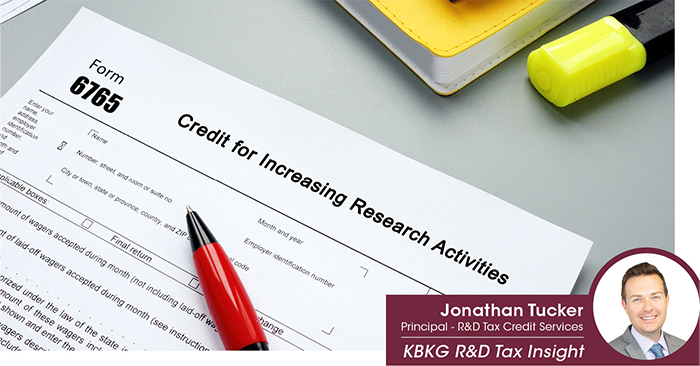By Jonathan Tucker | Principal, Research & Development Tax Credits
This post was most recently updated on 2/18/2025 to reflect official changes from the IRS.
The IRS has officially released the new Form 6765 and its accompanying instructions. These forms are no longer in DRAFT status and should be filed with the 2024 Federal tax returns. Please note that Section G remains optional for the 2024 tax year. However, taxpayers are encouraged to familiarize themselves with this section and maintain the necessary documentation to complete it annually in future filings. The new Forms & Instructions can be found on the IRS Forms webpage.
On June 21, 2024, the IRS released an updated draft form 6765 – Credit for Increasing Research Activities, the tax form taxpayers must file with their tax returns to claim the R&D tax credit. This revised draft provides much-needed relief for taxpayers by reducing the amount of information required on the tax form and introducing several safe harbors.
KBKG Insight:
Prior to the 2024 tax year, some CPAs were able to claim R&D credits for their smaller clients without hiring a 3rd party expert. While the introduction of safe harbors has eased the burden for smaller taxpayers, many will still be required to provide onerous amounts of information. Due to these cumbersome and complex requirements, CPAs should consider using an experienced R&D Credit expert for credit claims over $50,000. However, for claims less than $50,000, CPAs can use KBKG’s Dash.tax R&D Credit software to calculate and report the appropriate R&D Credit.
Background
On September 15, 2023, the IRS released an initial draft of a new form 6765. This draft form was in reaction to Chief Counsel Memorandum 20214101F, which required all taxpayers filing an amended tax return to claim the R&D Tax Credit to provide an exorbitant amount of information. The release of this form would require taxpayers to include this same information on original return filings as well, regardless of the size of the taxpayer and magnitude of the R&D tax credit.
The IRS requested public comment on this initial draft form 6765, which they appeared to have taken seriously and provided relief based on many stakeholder comments. The most significant changes are for small and medium businesses. Section G, the business component detail, on the draft form 6765 will be optional for “qualified small business” taxpayers that are electing the payroll tax credit and for taxpayers that have total qualified research expenditures (“QREs”) equal to or less than $1.5 million and gross receipts equal to or less than $50 million.
For larger taxpayers that do not meet the requirements above, the IRS reduced the number of business components that must be reported in Section G. For these taxpayers, they must report 80% of their total QREs in descending order by business component, but with a maximum of 50 business components. In addition, the amount of information required to be provided for each business component has been reduced. Taxpayers are no longer required to delineate whether a business component is new/improved, a sale/lease/license, or provide a description of the information sought to be discovered.
The IRS will release the instructions for filing at a later date, which will outline business component selection types (which have also been reduced), and the definitions for officers, controlled group reporting and business component descriptive names.
This revised Section G is optional for all taxpayers, regardless of size, for tax year 2024 (processing year 2025). Section G will be effective for required taxpayers, as outlined above, for tax year 2025 (processing year 2026).
Action Items
Claiming the R&D tax credit is not getting easier and is becoming more scrutinized by the IRS. To get help with claiming the R&D tax credit, please reach out to a KBKG representative or visit KBKG.com for more information.
About the Author
Jonathan Tucker | Principal – Research & Development Tax Credits
Jonathan Tucker is based in Atlanta, GA, and has over 20 years of experience providing federal business tax advisory services, primarily in R&D tax credits, to clients in various industries including technology, manufacturing, transportation, healthcare, retail and consumer products, hospitality, media and entertainment, financial, and other professional services industries. Read More



